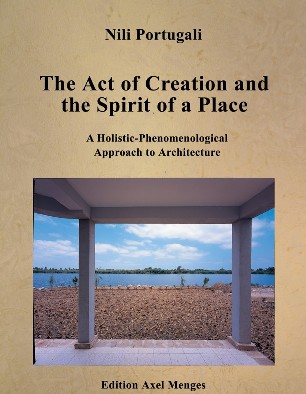![]()
![]()
![]()
|
Coming Lecture & Events Nili Portugali, Architect
A.A.Dip. R.I.B.A
 NAI - The Netherlands Architecture Institute, NAI - The Netherlands Architecture Institute, Rotterdam, NL Friday 6th of October 2006 at 6.30 pm Oxford Brookes University, Department of Architecture, Oxford, U.K. Monday 9th of October 2006 at 6pm Dresden
University of Technology, Faculty of Architecture, Dresden, De Rietveld
Academy,
Architecture Department, Amsterdam
The aim of this lecture is to present
Portugali’s particular interpretation of the
holistic-phenomenological worldview in
theory and in practice, a worldview which stands in
recent years at the forefront of the scientific discourse as
a whole and is tightly related to Buddhist philosophy, in projects she
designed and built in Israel. The first part of the presentation will present her particular
interpretation of the holistic-phenomenological worldview in theory and
in practice. The second part will demonstrate how this approach, as well as her
unique planning process stemming from it strictly related to the spirit
of the place (based on the way things actually exist already
on site) were implemented in a selected projects designed and built by
her in Israel in relation to the physical, cultural and social reality
of the place they were planned and built on, an Israeli reality which
reflects a unique interface between the orient and the west, an
interface Portugali herself represents.
Abstract The purpose of architecture, as I see it, is first
and foremost to create a human environment for human
beings. The real challenge of current architectural
practice is to make the best use of the potential inherent in our
modern technological age. Yet, modern society has lost the value
of man and thus created a feeling of alienation between man
and the environment.
Buildings affect our lives and the fate of the
physical environment in which we live over the course of many years,
and therefore their real test is the test of time. The great
buildings, villages and temples in which man feels ‘at
home’ – the places we always want to return to,
thus with timeless relevance are the ones
that touch our hearts, and have the power to create a deep emotional
experience. Although this timeless
quality exists in buildings rooted in different
cultures and traditions, the emotional experience they generate is common
to all people, no matter where or from what culture
they come from. Thus Christopher Alexander’s basic assumption
was that behind human architecture there are universal and eternal
codes common to us all as human beings, and that
there is absolute truth underlying beauty and comfort that reflect the
“innate patterns”
(used by Chomsky’s terminology of the spoken
language), which are already structured in our mind. Contemporary architecture (and art) sought to
dissociate themselves from the world of emotions and connect the design
process to the world of ideas, thus creating a rational relation
between building and man, devoid of any emotion. The basic argument presented here is that in order to change the feeling of the environment and create places and buildings we really feel ‘at home’ and want to live in, what is needed is not a change of style or fashion, but a transformation of the mechanistic worldview underlying current thought and approaches. I hope that by presenting an approach which tries
both to identify the needs common to us all as human
beings, codes that cross cultures and
link them together in harmony, and by applying a planning process which
structurally responds to the identity of each cultural and
social group we build for, and to the uniqueness of
each site, I will contribute something towards replacing current
conceptions and approaches whereby political motives and egotistical
ambitions create the kind of architecture that forms a real threat to
the physical and human environment we live in, and create places and
buildings that we really feel part of and want to live in.
She is a graduate of the Architectural Association
School of Architecture (A.A), London. She studied
architecture and Buddhism at the University of California in Berkeley,
and worked and participated in research with Prof. Christopher
Alexander at the Center for Environmental Structure in Berkeley. Her
firm is involved in a variety of projects in unique areas of historic
or environmental sensitivity, in urban design, architecture, landscape
design and interior design, disciplines she regards as one continuous
system. She has recently published her new book nominated for The
RIBA International Book Award Architecture Prize 2007: |
|



